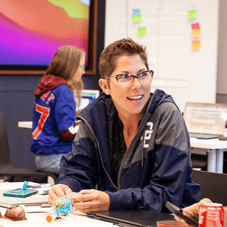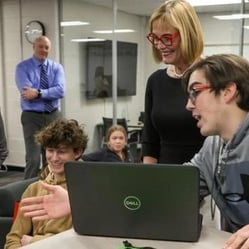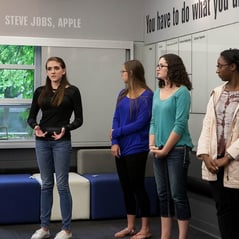Driving Student Success Amid Uncertainty
In 2020, we wrote “Learning with a Purpose: Preparing Today’s Students to Navigate an Increasingly Ambiguous Future” a look at how entrepreneurship education can better prepare students for an uncertain future. Then COVID-19 hit, and it was no longer just the future that was uncertain. We were interested in how those enrolled in experiential learning courses would respond, so we began a second paper exploring the role student agency plays in driving success amid uncertainty. Our hypothesis was that the focus on agency in experiential learning programs would enable students to adapt more readily to the pandemic’s challenges. Sure enough, we discovered INCubatoredu high school entrepreneurship students whose work wasn’t being held up by remote learning — because they were directing their own learning rather than waiting for instructions.
Rediscovering Joy
 Amid stories of amazing students, another trend emerged: we heard teachers declare their love for the profession. Despite daily stories about increased stress and anxiety driving teachers away, these educators used words like “joy” to describe their experiences. To be clear, those teachers were keenly aware of the challenges during school closures. But we heard enough to broaden the report’s focus to include the joy that entrepreneurship education programs bring teachers.
Amid stories of amazing students, another trend emerged: we heard teachers declare their love for the profession. Despite daily stories about increased stress and anxiety driving teachers away, these educators used words like “joy” to describe their experiences. To be clear, those teachers were keenly aware of the challenges during school closures. But we heard enough to broaden the report’s focus to include the joy that entrepreneurship education programs bring teachers.
This idea of discovering joy in teaching is perhaps even more relevant today. The 2021-22 school year presented new COVID-19 variants, deepening racial inequities and growing scrutiny over curricula. It’s no wonder teachers say they’re unhappier in their jobs than ever before. One poll found that a staggering 55% said they will retire or leave their jobs earlier than planned, a number that rose 18 percentage points in just five months.1 A separate survey identified low student engagement as a top frustration.2
There are no easy answers to teacher satisfaction, a complex problem that requires a multi-faceted approach to repair. But one piece of the puzzle may lie in experiential learning. To explore this concept further, we talked to more educators about the ways curricula promoting student engagement and agency lead to increased teacher satisfaction. Below are some themes that emerged from those conversations and interviews we conducted for the previous reports. We hope they make the case for experiential and project-based learning as part of a larger strategy to increase teacher satisfaction.
Theme 1: The Joy of Engagement
Researchers and classroom teachers long ago recognized the connection between experiential learning and deeper engagement among students. Studies show that the “technique improves student engagement by enabling knowledge and information-sharing and discussion.”3

What hasn’t been documented as thoroughly — at least not yet — is the impact increased student engagement has on teacher satisfaction. Instructors who lead experiential learning courses say watching their students engage in authentic learning for the first time has renewed their passion for the profession. “As educators, nothing brings us more satisfaction than seeing our students succeed, and the satisfaction of seeing them figure out a solution to a question or problem doesn’t come close to the joy that comes from seeing them come up with the problem or question themselves in the first place,” said Kimberley Harrington Markus, the former New Jersey commissioner of education.4
In many cases, remote instruction deprived teachers of the exhilaration of seeing students “get it.” In May 2020, only 10% of teachers in a national survey said online attendance was as high as in-person learning.5 This had a disastrous effect on teachers’ esprit de corps: nearly 75% said their morale had declined since the pandemic.6 That wasn’t necessarily the case for all teachers, though, especially those teaching entrepreneurship. INCubatoredu instructors Stephan George and Dana Jones of Vista Ridge High School in Texas reported high levels of attendance and engagement: “Everyone was there with cameras on every day. It was incredible,” Jones said. “The learning didn’t slow down at all, and the students didn’t leave their bedrooms.”
“Everyone was there with cameras on every day. It was incredible...The learning didn’t slow down at all..."
~Dana Jones, Vista Ridge High School, Leander ISD
For entrepreneurship teachers, satisfaction comes from working with teenagers who don’t have to be prodded or bribed to complete their work. As Ted Coiné , a teacher of the INCubatoredu course at Collier County Public Schools in Florida, noted, “It’s incredible to see the students develop the skills to work independently without guidance from me or other adults.” For instance, “one of the teams was able to anticipate the next step in the process for their in-school boxed lunch delivery business," he continues, "and built the website before I even told them to.” he said.
“It’s incredible to see the students develop the skills to work independently without guidance from me or other adults.”
~Ted Coiné, Teacher, Lorenzo Walker Technical HS and College, CCPS
Theme 2: The Joy of Teaching a Range of Skills
The workforce is changing at a dizzying pace. Employers are increasingly relying on technology for tasks that were traditionally performed by workers with less advanced skills.7 But those same employers are also placing a high premium on strong cognitive, social-emotional and critical thinking skills.8 This reality isn’t lost on teachers, particularly those whose courses develop skills like agency, collaboration and resilience.
“These skills separate students from their peers. I see it, and I’ve heard this from my graduates,” said Hagop Soulakian, an INCubatoredu teacher at Barrington High School in Barrington, Illinois, who helped shape the curriculum in the inaugural course to Barrington in 2013. “We prepare kids to take tests and take AP exams to build their resume, and some of that is OK … but they won’t be ready without the soft skills.”
from my graduates,” said Hagop Soulakian, an INCubatoredu teacher at Barrington High School in Barrington, Illinois, who helped shape the curriculum in the inaugural course to Barrington in 2013. “We prepare kids to take tests and take AP exams to build their resume, and some of that is OK … but they won’t be ready without the soft skills.”
When the students are engaged, so are the teachers. Take agency. As important as it is for students, it may be equally vital for teachers. It ignites a special kind of joy: the joy of teaching someone how to learn. Tony Miller, an entrepreneurship teacher from Township High School District 211’s Conant High School in Illinois, knew his students had developed agency when they called him at night or on weekends to answer a question or provide an opinion about a new direction a team is considering. When students display that level of enterprise and drive, great teachers will move heaven and earth to help. “You’ll take time out of your personal life to have conversations with them on Slack, to look at what they’ve created, to spend time on a Saturday or Sunday working on their business model,” he said.
"When students display that level of enterprise and drive, great teachers will move heaven and earth to help."
~Tony Miller, Conant High School, Township High School District 211
Kurt Wismer, an INCubatoredu teacher at Horace Mann High School in North Fond du Lac, Wisconsin, often mentions a former student who, after taking his course, studied entrepreneurship at the University of Milwaukee-Wisconsin. The business she created won money through pitch events, which enabled her to cover tuition. “Her story and others like it remind me why I do what I do,” he said. “The best part is seeing the students be successful in their work. It’s had a dramatically positive impact on me as a teacher (and) the students I serve.”
Theme 3: The Joy of Teachers as Learners
Above all, teachers recognize the power of learning. They know how gratifying it can be to discover a little-known fact, to be curious and seek understanding, and to expand perspective and skills. They understand those feelings because they’re learners at heart. Because of that, entrepreneurship teachers say one of the most joyful parts of their job is that they’re always learning something new — whether it’s a new way to support students or something that broadens their personal or professional knowledge.
“For me, it’s always something new — and I like that. I don’t like to be stagnant,” said Melodi Kunn, an entrepreneurship teacher at Dieterich Middle School in the Midlothian Independent School District in Texas.
 The variety alone is enough to get entrepreneurship teachers excited to come to school every day. Take Falia Justima, who teaches entrepreneurship education at Immokalee High School in Florida’s Collier County Public Schools. As teams of her INCubatoredu students create a product or service that solves a problem in their community, they’re researching everything from product engineering to the demographics of their target buyers. And that means Justima is learning it alongside them.
The variety alone is enough to get entrepreneurship teachers excited to come to school every day. Take Falia Justima, who teaches entrepreneurship education at Immokalee High School in Florida’s Collier County Public Schools. As teams of her INCubatoredu students create a product or service that solves a problem in their community, they’re researching everything from product engineering to the demographics of their target buyers. And that means Justima is learning it alongside them.
“One day I may discover how to create an effective website for a new business, and the next I may learn about the housing market,” she said. “Expanding my own learning by exploring new ideas and topics keeps the profession fresh and exciting.”
“Expanding my own learning by exploring new ideas and topics keeps the profession fresh and exciting.”
~ Falia Justima, Teacher, Immokalee High School, Collier County Public Schools
Entrepreneurship teachers also say that the experience exposes them to a new way of teaching, one that relies less on “sage on the stage” and more on student agency and resilience. For Nicki Mullin, a family and consumer science teacher at Madison Junior High School in Naperville, Illinois, developing her own entrepreneurial mindset through Entrepreneurship Across the Curriculum workshops has led to her blending new teaching strategies with her tried-and-true techniques. “You can find a way to use these tools the very next day in every aspect of your curriculum,” she said.
“What excites me is hearing teachers say, ‘I’m teaching in a different way and it’s bringing joy back to my teaching,’” said Janet Sommerville, project manager for learner services in the Naperville Community School District in Illinois.
Remembering Joy
.jpg?width=263&name=INCUBATOR%20(16%20of%2052).jpg) At a time when teaching has never been more stressful or more demanding, it’s incumbent on district leaders to find ways to make the job more joyful. The answer is surprisingly uncomplicated. Teachers thrive on two things: kids who look forward to coming to school and kids who want to direct their own learning. COVID-19 has created significant barriers to both of those experiences, but it hasn’t been impossible. Yes, experiential learning prepares students for the challenges of the future, both academic and work-based. But these courses also provide a breath of fresh air for a group of people who most need one: teachers.
At a time when teaching has never been more stressful or more demanding, it’s incumbent on district leaders to find ways to make the job more joyful. The answer is surprisingly uncomplicated. Teachers thrive on two things: kids who look forward to coming to school and kids who want to direct their own learning. COVID-19 has created significant barriers to both of those experiences, but it hasn’t been impossible. Yes, experiential learning prepares students for the challenges of the future, both academic and work-based. But these courses also provide a breath of fresh air for a group of people who most need one: teachers.
“There’s an intrinsic feeling you get as an educator when you see the kids go the extra mile — 15-, 16-, 17-year-olds who were able to do this,” said Miller.
Most of all, it gives educators an opportunity to see their students develop in meaningful ways. And that may be the greatest source of joy for teachers in these programs, said Adam Creapo, Assistant Principal and the Career Connect Pathways Director at Northfield High School in Denver. A student recently enrolled in the INCubatoredu course because he wants to be a mechanic instead of going to college. “He might be able to run his own shop one day because of the work and the lessons that he learned (in INCubatoredu),” Creapo said. “As an educator, you can't ask for anything more than that.”9
Explore entrepreneurship as a path to student skill development and teacher satisfaction. New Teacher Workshops could be a solid start for your school or district.
 This is a guest post by author Evo Popoff. Evo was named State Policy Maker of the Year by the State Education Technology Directors Association and ranks among the small handful of education policymakers who have worked as education entrepreneurs and executives in the private sector. Evo previously served as chief innovation and intervention officer and assistant commissioner for the New Jersey Department of Education, and now serves as Strategic Advisor & Leader - Whiteboard Advisors.
This is a guest post by author Evo Popoff. Evo was named State Policy Maker of the Year by the State Education Technology Directors Association and ranks among the small handful of education policymakers who have worked as education entrepreneurs and executives in the private sector. Evo previously served as chief innovation and intervention officer and assistant commissioner for the New Jersey Department of Education, and now serves as Strategic Advisor & Leader - Whiteboard Advisors.
1 Walker, Tim. “Survey: Alarming Number of Educators May Soon Leave the Profession.” National Education Association, February 1, 2022. https://www.nea.org/advocating-for-change/new-from -nea/survey-alarming-number-educators-may-soon-leave-profession
2 Najarro, Ileana. “A Tenuous Balance: Supporting Students While Pushing Their Learning Recovery” EducationWeek, February 8, 2022. https://www.edweek.org/leadership/a-tenuous-balance-supporting -students-while-pushing-their-learning-recovery/2022/02
3 Almulla, Mohammed. “The Effectiveness of the Project-Based Learning (PBL) Approach as a Way to Engage Students in Learning.” SAGE Open, July 2020. https://journals.sagepub.com/doi/10.1177/ 2158244020938702
4 Interview with Kimberley Harrington Markus
5 Hill, Heather C. “Remote Learning Cuts Into Attendance. Here Are Remedies.” EducationWeek, December 3, 2020. https://www.edweek.org/leadership/opinion-remote-learning-cuts-into-attendance -here-are-remedies/2020/12#:~:text=Unsurprisingly%2C%20surveys%20and%20district%20data,the%20start%20of%20the%20pandemic.
6 “Student Engagement During the Pandemic: Results of a National Survey.” EdWeek Research Center. https://epe.brightspotcdn.com/a1/c1/985fa9434b8eac23cd3bbd2f78b0/student-engagement-during-the-pandemic-final-10.13.21.pdf
7 The Changing Nature of Work.” World Bank Group, 2019. https://www.worldbank.org/en/publication /wdr2019
8 Ibid.
9 Webinar link https://www.unchartedlearning.org/community/videos/WEBINAR-Learning-with-a-Purpose-Entrepreneurship-CTE-and-the-Evolving-World-of-Work